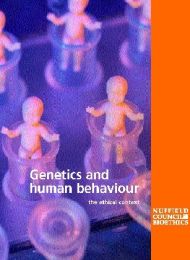Genetics and human behaviour: the ethical context
Report
Published 01/10/2002

Research is exploring how genes and the environment influence behavioural traits such as aggression, anxiety, intelligence and sexual orientation.
- To define and consider ethical, social and legal issues arising from the study of the genetics of variation within the normal range of behavioural characteristics.[1]
- To survey the current field of research, in particular, to review:
- the evidence for the relative importance of genetic influences;
- the basis for characterisation and measurement of behaviour;
- the relationship between normal variation in behaviour and disease processes.
- To consider potential applications of the research.
- To consider:
- the ethics of undertaking research on the genetics of normal variation in behavioural characteristics[2] on human participants[3];
- the implications of applying the findings of such research through the development of genetic tests to establish particular characteristics in practical contexts including education, employment, insurance, legal proceedings;
- the particular impact of the findings of a genetic test on the individual, including an individual child or fetus, on family members, and on various social groups;
- the broader impact of genetic knowledge on the perception of those with relevant behavioural characteristics, including questions about stigma.
Footnotes:
[1] And to identify the issues which are additional or complementary to those dealt with in the Council’s report on Mental Disorders and Genetics: the ethical context.
[2] Including, for example, research on intelligence, antisocial behaviour, sexual orientation and addiction.
[3] Including ethnic groupings, criminal offenders, and children.

Share